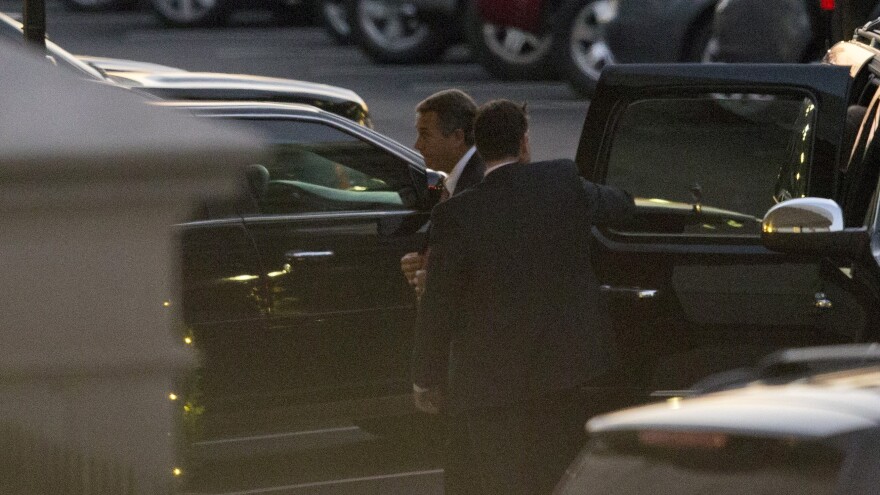If President Obama and House Speaker John Boehner's closed-door meetings aimed at solving the fiscal cliff crisis trouble anyone, you'd expect it to be the open-government watchdogs who routinely bark their outrage at public officials who work overtime to avoid public scrutiny.
But Obama and Boehner's secret meetings (they held another at the White House on Monday) and one-on-one phone calls have been the case of the watchdogs that haven't barked. Open-government advocates aren't necessarily troubled by the closed meetings — unlike, say, conservative anti-tax activist Grover Norquist, who has inveighed against Obama holding talks behind closed doors
Let's be realistic, government-transparency advocates say: It stands to reason that sometimes leaders need to meet privately to reach an agreement.
"Government transparency should never mean that there can be no private conversations," says Melanie Sloan, executive director of the Citizens for Responsibility and Ethics in Washington. "Politics is the art of compromise, and sometimes compromise has to be reached behind closed doors. With all the vast constituencies interested in this, if both sides have to constantly play to their bases in every phrase uttered, they can't get to a compromise."
Including 'Time For The World To See It'
"Negotiations often have to be private, and there's a place for frankness and private conversations in politics and in governing," says John Wonderlich, policy director for the Sunlight Foundation, another of Washington's better known government-transparency organizations.
But just because government-transparency hawks understand the need for policymakers to at times hold talks behind closed doors, it doesn't mean they don't still demand a level of accountability that political leaders might chafe at.
"What we should expect is once the deal is reached, and before people vote on it, there's adequate time for the world to see it and read it," Sloan says. "I think there should be transparency in whatever it is [lawmakers] are expected to vote on."
Wonderlich agrees there needs to be enough time for lawmakers and the public to absorb the details before any fiscal cliff legislation is voted on.
And he says a more fundamental concern is that our governing process has become so dysfunctional, our leaders have now gotten accustomed to the idea that it takes such closed-door meetings whose results are then ratified by Congress to manage the nation's affairs.
"The problem is that when that becomes the way the most important business is done," Wonderlich says. "It's not just deliberations. It's hashing out exactly what's going to happen, and then Congress is just treated as a rubber stamp. The only thing that happens publicly is rubber stamping a deal. And the ultimatum is catastrophe. So here's your choice, democracy: choose catastrophe, or something that two people in a room decided together."
Wonderlich has written a blog post on the Sunlight Foundation website in which he makes the same point. In it, he recommends, among other things, that the public and news media be skeptical of accounts of the negotiations, since participants have a way of describing such talks in ways that put them in the best light.
Undercutting The Lobbyists
Sunlight joined several other good-government groups that sent a letter to Obama and congressional leaders regarding the fiscal cliff negotiations. While the groups acknowledge the need for private talks, they call for whatever legislation results from the negotiations to be available at least 72 hours before a vote.
While most members of Congress and the public may be excluded from details of the private negotiations, so are lobbyists. That's a good thing, according to transparency watchdogs who say the involvement of lobbyists working on behalf of their narrow interests could make a deal impossible.
True, the closed-door negotiations do represent a departure from the kind of transparency Obama promised during his 2007-2008 presidential campaign. Back then, Obama promised to hold negotiations for health care legislation on C-SPAN.
That was Obama's way of contrasting himself with his Democratic opponent at the time, Hillary Clinton. When she led the Clinton administration's failed effort at health care reform in the early 1990s, she held closed-door meetings that were criticized as such.
Conservatives like Norquist and Sen. Jeff Sessions of Alabama have criticized Obama for not living up to those early vows of televised negotiations in the current fight.
Sloan dismisses such criticisms as cynical politics.
"Some of the people who are screaming about transparency the loudest are the most ridiculous," she says. "They have never believed in transparency a previous day in their lives. They're only advocating something they believe will scuttle a deal."
Copyright 2020 NPR. To see more, visit https://www.npr.org. 9(MDAxNDQ2NDAxMDEyNzU2NzM2ODA3ZGI1ZA001))







